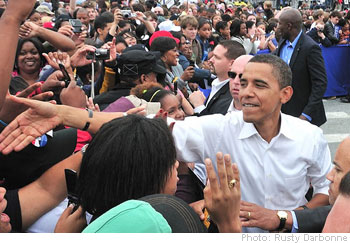 When the applause among Democrats and recriminations among Republicans begin to quiet down — probably within the next few days — the President will have to make some big decisions. The biggest is on the economy.
When the applause among Democrats and recriminations among Republicans begin to quiet down — probably within the next few days — the President will have to make some big decisions. The biggest is on the economy.
His victory and the pending “fiscal cliff” give him an opportunity to recast the economic debate. Our central challenge, he should say, is not to reduce the budget deficit. It’s to create more good jobs, grow the economy, and widen the circle of prosperity.
The deficit is a problem only in proportion to the overall size of the economy. If the economy grows faster than its current 2 percent annualized rate, the deficit shrinks in proportion. Tax receipts grow, and the deficit becomes more manageable.
But if economic growth slows – as it will, if taxes are raised on the middle class and if government spending is reduced when unemployment is still high – the deficit becomes larger in proportion. That’s the austerity trap Europe finds itself in. We don’t want to go there.
This is why January’s so-called “fiscal cliff” — $600 billion in automatic spending cuts and tax increases – is so dangerous. It’s too much deficit reduction, too soon. Tax increases on the middle class would reduce their spending just when the economy needs that spending in order to keep growing, and cuts in government’s own spending would make the problem worse.
If we go over the fiscal cliff, we’re in another recession. Don’t just take my word for it. That’s also the view of the Congressional Budget Office and most private economic forecasters.
The way to ensure continued growth is to continue the President’s payroll tax cut and extend the Bush tax cuts for income under $250,000, and continue government spending.
The way to increase growth is to permanently exempt the first $20,000 of income from the payroll tax and make up for lost revenues by raising the ceiling on income subject to it (that ceiling is now $110,100). And increase government spending — especially on critical public investments like education, job training, and infrastructure.
Any “grand bargain” on deficit reduction should contain a starting trigger — and that trigger should be when the economy can safely be assumed to be back on track. I’d make that trigger 6 percent unemployment and 3 percent economic growth for two consecutive quarters, and make sure that trigger was in the legislation.
The President needs to make it clear to the public that the only way we can achieve a better economy is through a larger and more buoyant middle class. If we continue lurching toward widening inequality and ever more concentrated income and wealth at the top, the vast middle class – as well as all those who aspire to join it – won’t have the purchasing power to grow the economy and create more jobs.
That’s why taxes must be increased on the wealthy, and the proceeds used to reduce the deficit over the long term, extend and enlarge the Earned Income Tax Credit (a wage subsidy for lower-income workers), and invest in education.
The President’s victory doesn’t give him a clear mandate to achieve any of this – the margin of victory was too small, and he didn’t tell the American electorate explicitly that his priority would be creating jobs and growing the middle class instead of reducing the deficit.
But his victory gives him the attention of the nation and the authority that comes with having won reelection. It therefore gives him the opportunity to recast the economic debate. The upcoming fiscal cliff makes it particularly urgent he do so quickly.



Leave a Reply